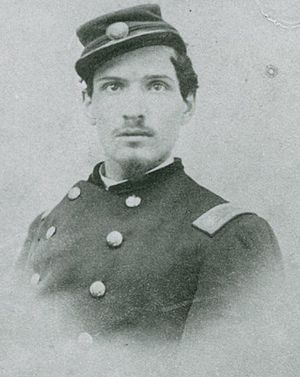William Wade Dudley facts for kids
Quick facts for kids
William W. Dudley
|
|
|---|---|
 |
|
| 13th United States Commissioner of Pensions | |
| In office June 27, 1881 – November 15, 1884 |
|
| President | James A. Garfield Chester A. Arthur |
| Preceded by | John A. Bentley |
| Succeeded by | Otis P. G. Clarke |
| United States Marshal for the District of Indiana | |
| In office 1879–1881 |
|
| President | Rutherford B. Hayes |
| Personal details | |
| Born |
William Wade Dudley
August 27, 1842 Weathersfield Bow, Vermont |
| Died | December 15, 1909 (aged 67) Washington, D.C. |
| Resting place | Arlington National Cemetery Arlington, Virginia |
| Political party | Republican |
| Spouses |
|
| Children |
|
| Signature | |
| Military service | |
| Allegiance | |
| Branch/service | Union Army |
| Years of service | 1862–1865 |
| Rank | |
| Unit | 19th Ind. Vol. Infantry Reg. |
| Battles/wars | American Civil War
|
William Wade Dudley (born August 27, 1842 – died December 15, 1909) was an American lawyer and politician. He was also an officer in the Union Army during the American Civil War. Dudley served as the United States Commissioner of Pensions under Presidents James A. Garfield and Chester A. Arthur. He was also the Treasurer for the Republican National Committee. He was wounded and lost his leg during the Battle of Gettysburg.
Contents
Early Life and Family Background
William Wade Dudley was born in Weathersfield Bow, Vermont. His father, Reverend John Dudley, was a well-known minister. His mother was Abigail Wade. William's family had a long history in America. His ancestors were among the first settlers in Guilford, Connecticut, back in 1639. His mother's grandfather, Colonel Nathaniel Wade, even served with General George Washington during the Revolutionary War.
Military Service in the Civil War
Before the war, William studied at Phillips Academy in Danville, Vermont, and Russell Military Academy in New Haven, Connecticut. When the American Civil War began, he joined the Union Army. He became a captain of a group of volunteers from Richmond, Indiana.
His company became part of the 19th Indiana Infantry Regiment. This regiment was famous for being part of the Iron Brigade in the Army of the Potomac.
Key Battles and Promotions
At just 19 years old, William showed great bravery. During the Battle of Antietam, he took command of his regiment after his leader was killed. After this battle, he was quickly promoted to Major and then to Lieutenant Colonel.
Later, at the terrible Battle of Gettysburg, his regiment suffered heavy losses. William himself was badly wounded and had to have his right leg removed. Even after his injury, he continued to serve the army. He worked as an inspector and a judge. For his courage in battle, he was given an honorary promotion to Brigadier General in 1865.
Life After the War
After the Civil War ended, William Wade Dudley started a new career. In 1870, he became a civilian lawyer.
Public Service and Political Roles
William then moved into public service. In 1879, he became the U.S. Marshal for Indiana. A U.S. Marshal is a federal law enforcement officer.
In 1881, Presidents James A. Garfield and Chester A. Arthur appointed him as the Commissioner of Pensions. This role involved managing payments to veterans and their families.
Later, in 1888, he was appointed Treasurer of the Republican National Committee. This committee helps lead the Republican Party. After his time in politics, he went back to practicing law in 1887.
Personal Life and Passing
William Wade Dudley was married twice. His first wife was Theresa Fiske, whom he married in 1864. They had four children together. After Theresa passed away in 1897, he married Nannie A. Robinson. They remained married until his death.
William Wade Dudley passed away from natural causes on December 15, 1909, in Washington, D.C. He was buried a few days later at Arlington National Cemetery.
Images for kids
 | Anna J. Cooper |
 | Mary McLeod Bethune |
 | Lillie Mae Bradford |

